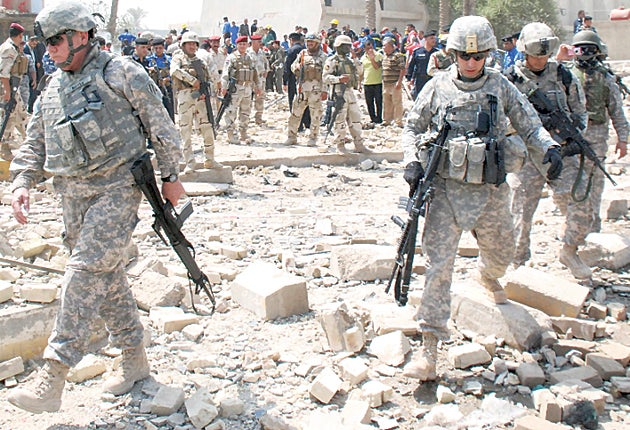As the US troops depart, bombs rip through Iraq

Al-Qa'ida showed that it has the strength to strike all over Iraq yesterday by making a string of attacks that left at least 56 dead, half of them policemen and soldiers, and 250 wounded, across at least thirteen cities and towns.
The bombings came a day after the US cut the number of its troops in Iraq to below 50,000 and withdrew the last of its combat brigades. The attacks undermine the Iraqi government's claim to have succeeded in greatly improving security and weakening al-Qa'ida.
The heaviest casualties were in the city of Kut, 100 miles southeast of Baghdad on the Tigris river. A suicide bomber in a car penetrated security barriers and detonated his explosives between a police station and provincial government headquarters, killing 19 people, 15 of them policemen.
A further 90 people were wounded. Part of the police building collapsed with many bodies still inside, including that of the local police chief.
"I rushed to the scene to help evacuate the people, and saw body parts and hands scattered on the ground and dead bodies of policemen," government employee Yahya al-Shimari told AP in Kut.
"I also saw a traffic policeman lying dead on the ground. There were about 15 cars that were burnt." At the Kut hospital, "there were so many wounded people that the hospital was not able to take all of them", said Dr Walid Khalid.
The attacks yesterday show that al-Qa'ida still has the men and the organisation to strike from Mosul in northern Iraq to Basra in the south. Moreover, many of the bombings, such as those in Kut, Basra and Kerbala, took place deep in Shia territory that in the recent past has been largely secure.
The government had been hoping al-Qa'ida was losing strength because so many of its leaders have been killed or captured over the past year.
There was also believed to be a reduced flow of foreign volunteers for suicide bombings entering the country, mainly through Syria.
Al-Qa'ida has not yet claimed responsibility for the bombings but they bear the hallmark of the group's operations. One vehicle packed with explosives blew up in a parking lot behind a police station in north Baghdad yesterday, killing 15 people, including six policemen, and wounding 58 others. The blast left a crater nine feet deep.
There is no direct connection between the departure of the Americans and the bombings. When the Americans had 170,000 troops in Iraq three years ago they were also unable to stop the bombers, who usually attack soft targets. Civilian casualties have fallen from 3,000 a month in 2006-7 to 200 to 300 a month today.
The success of the bombers in getting through security checks all over Iraq on a single day will deepen the sense that the government is failing to restore normal life. The government of Prime Minister Nouri al-Maliki is also losing legitimacy because no new administration has been formed since the parliamentary election on 7 March.
Not all the suicide bombers got through. In Mosul Iraqi soldiers shot and killed a suicide bomber as he tried to blow up his car. But in Buhriz in Diyala province, northeast of Baghdad, gunmen blew up police buildings and then raised the black al-Qa'ida flag.
In the old al-Qa'ida stronghold of Fallujah west of Baghdad, a city captured by US Marines in 2004, a suicide bomber rammed a military convoy, killing one soldier and wounding others.
Join our commenting forum
Join thought-provoking conversations, follow other Independent readers and see their replies
Comments